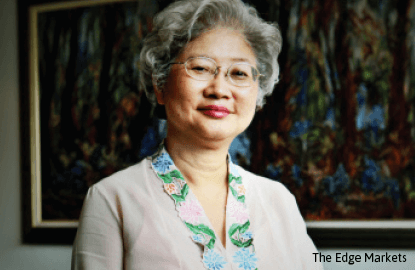
This article first appeared in The Edge Malaysia Weekly, on November 2 - November 8, 2015.
Low-profile oil palm planter United Malacca Bhd (UMB) is looking to expand into Indonesia. If successful, this would be its first venture outside Malaysia.

It is eyeing at least 10,000ha of contiguous, greenfield land there, according to Tan Siok Choo, chairperson of UMB (fundamental: 2.55; valuation: 2).
“We will be new to Indonesia, so we need to find partners that know the environment. We want to work as equal partners, so they would have to take up a meaningful stake — nothing less than 20%,” she tells The Edge in a recent interview.
“Only a large hectarage justifies the cost of CSR (corporate social responsibility) activities such as building hospitals, schools, mosques and so on,” Tan says, explaining why 10,000ha would be the group’s minimum requirement.
Currently, UMB has 22,400ha in Peninsular Malaysia and Sabah, all of which have been fully planted up.
Of this, some 5,700ha or 26% of its total hectarage are still immature, while 14% are between four and seven years old (see chart on Page 40). This is where future growth will come from as oil palms begin peak production from about eight years of age.
UMB has net cash and equivalents of RM199.6 million that it can tap to fund the potential acquisition.
Tan says the group is also considering diversifying into vegetable crops, which are faster yielding and provide steady income, while its oil palms mature.
With land scarcity and the rising cost of labour in Malaysia, expanding into Indonesia seems to be the most sensible option, says Tan.

For one, there are not many sizeable plots left in Malaysia and they are pricey compared with Indonesia.
“From experience, greenfield land in Indonesia ranges from US$1,000 to US$5,000 per hectare (RM4,300 to RM21,500 at current exchange rate). In Malaysia, the average is between RM15,000 and RM16,000 per hectare. The cheapest offer we have received was RM8,000 per hectare and this was from a financially distressed company,” says Tan.
As for labour, the local federal government has just raised the national minimum wage in Budget 2016 by RM100 to RM1,000 per month in Peninsular Malaysia and by RM120 to RM920 per month in Sabah and Sarawak. This will be effective July 1 next year.
For UMB, which has about 2,800 estate workers, labour cost would increase between RM3.36 million and RM4 million per year.
Tan welcomes the wage hike but opines that it should come alongside incentives to mechanise the industry.
“The agriculture sector has been very complacent and we have had the luxury to do so. When crude palm oil (CPO) prices are above RM2,500 per tonne, it doesn’t matter because the industry still gets a thick margin with cost of production of between RM1,000 and RM1,500 per tonne,” Tan opines.
Oil palm planters in particular have been lamenting the end of the commodity boom in 2012 as CPO prices crashed from their peak levels of RM3,000 to RM4,000 per tonne. This year, the benchmark three-month futures contracts have averaged about RM2,200 per tonne, settling at about RM2,340 last Thursday.
In line with the broader market, UMB too saw its margins squeezed. Its net profit fell 32.7% year on year to RM47.2 million for the year ended April 30 (FY2015) while revenue fell to RM213.15 million, 12.8% lower than in FY2014.
Dividends also took a hit, coming it at 16 sen in total for FY2015 compared with 26 sen the year before. Even so, this was still a 70% payout compared with 76% in FY2014.
For its latest first quarter ended July 31, net profit was flat at RM12.3 million on the back of RM57.9 million in revenue.
To manage thinning margins, cutting cost and improving yields are key. “What we need is high-tech science,” says Tan, who is the daughter of the late Tun Tan Siew Sin, the former minister of trade and industry and minister of finance, and granddaughter of the late Tun Tan Cheng Lock.

To this end, UMB in 2012 committed RM2 million to fund research by Universiti Putra Malaysia in five key areas — developing high yielding, shorter palms; developing self-propelled rotary cutters for harvesting; mineral additives to enhance yields; developing early detection of ganoderma disease; and treating specific infections.
While UMB does not own any patents that may come out of the research, it has first right of refusal to commercialise any breakthroughs and developments.
The company was featured by Insider Asia two weeks ago, citing strong fundamentals and young tree age profile.
“UMB currently trades at an undemanding 0.74 times book with a decent dividend yield of 2.7%,” the research outfit says. It adds that considering the stock has fallen over the year, investors have an attractive entry point. The shares have slipped 7.85% y-o-y, closing at RM6.09 last Thursday for a market capitalisation of RM1.28 billion.
Of the three analysts covering UMB, two have “buy” calls while one recommends investors “hold” the stock, Bloomberg data shows.
They have a 12-month consensus target price of RM6.88, indicating a 13% upside on UMB.
Note: The Edge Research’s fundamental score reflects a company’s profitability and balance sheet strength, calculated based on historical numbers. The valuation score determines if a stock is attractively valued or not, also based on historical numbers. A score of 3 suggests strong fundamentals and attractive valuations. Visit www.theedgemarkets.com for more details on a company’s financial dashboard.
Save by subscribing to us for your print and/or digital copy.
P/S: The Edge is also available on Apple's AppStore and Androids' Google Play.